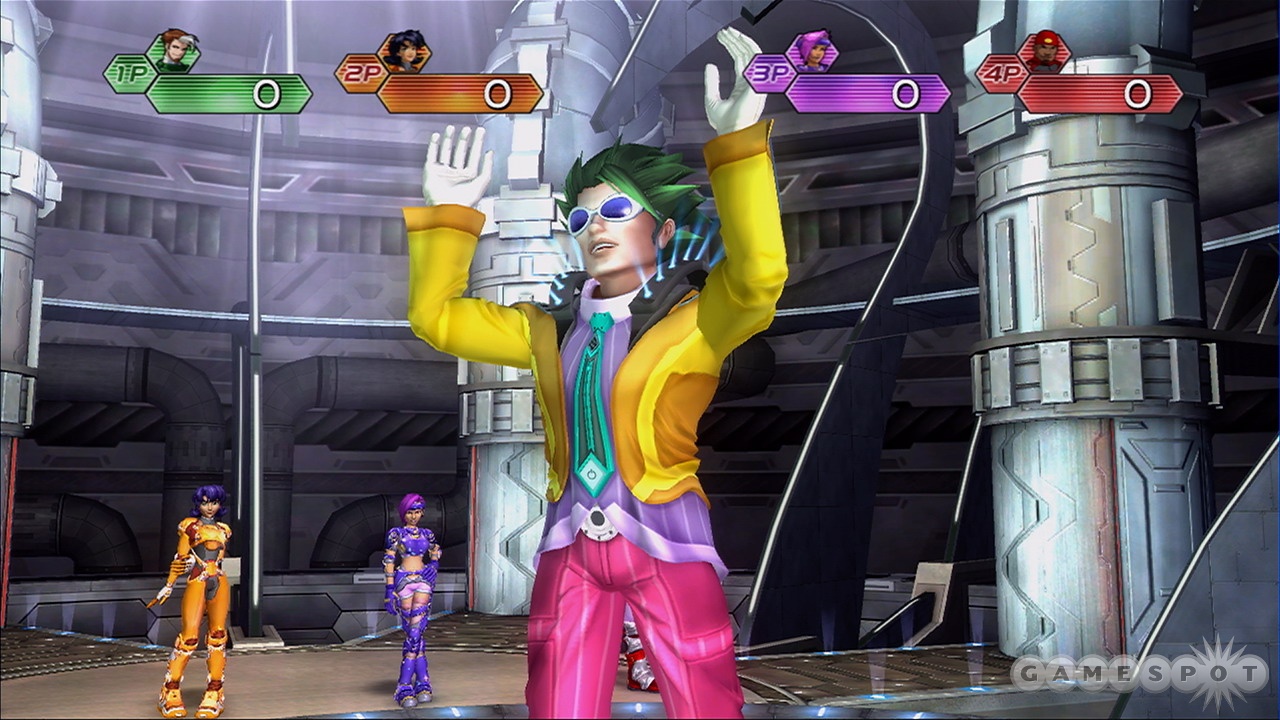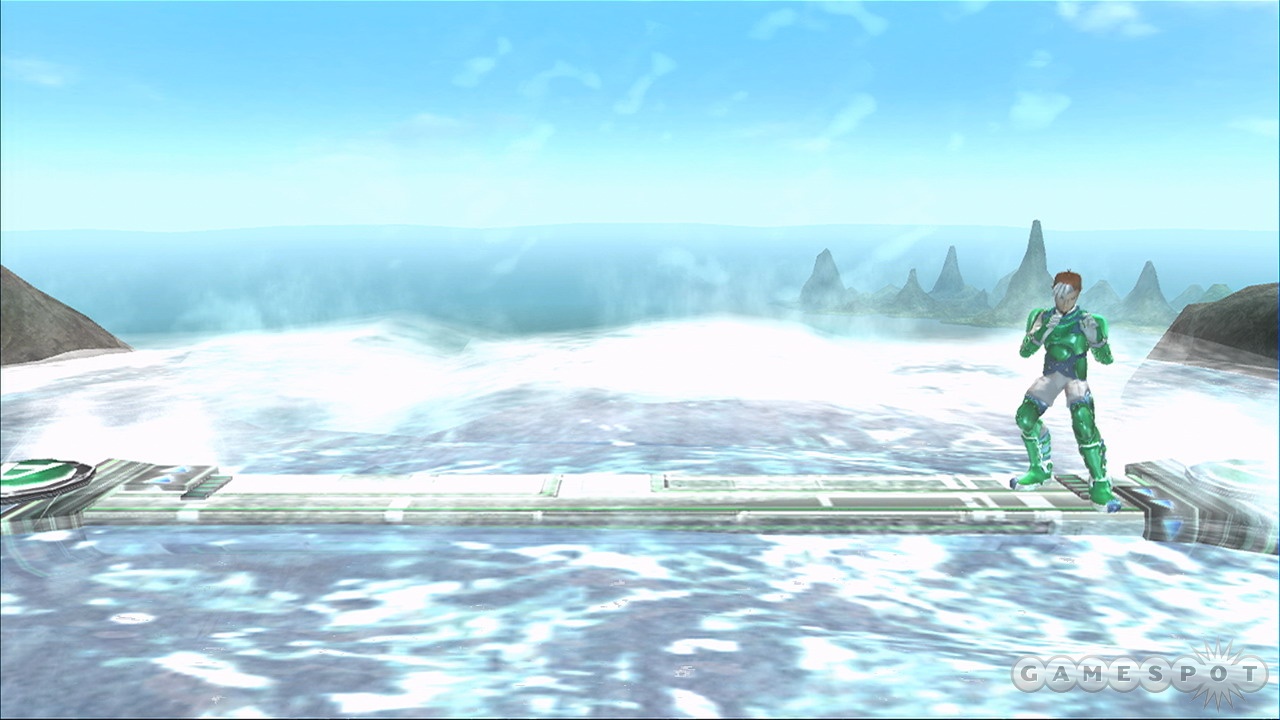Aside from its own Bomberman franchise, Japanese developer Hudson is probably most well known in recent years for developing the Mario Party games for Nintendo. Rather than try to emulate the successful Mario Party franchise as it did with the original Fuzion Frenzy, Microsoft has gone straight to the source for Fuzion Frenzy 2, having recruited Hudson itself to develop this Xbox 360 party-game sequel. Fuzion Frenzy 2 doesn't brim with recognizable mascot characters as the Mario Party games do; instead, it opts for a clumsy gameshow theme that features one of the most irritating in-game voice-overs in recent memory. The presentation can be generic and awkward at times, but the 40-plus minigames included are pretty varied and fun. Perhaps more importantly, Fuzion Frenzy 2 strips away a lot of the arbitrary reversals of fortune that have turned the Mario Party franchise into a bit of a game of chance.

Fuzion Frenzy 2 is essentially a collection of minigames that, on their own, will have a pretty familiar feel to anyone who's spent time with the original Fuzion Frenzy or any other similar party games. The quality of games like this is usually dictated by the quality of their minigames, and Fuzion Frenzy 2 has a good selection that doesn't vary too much in quality. There are callbacks to the original Fuzion Frenzy as you roll around in giant American Gladiator balls trying to bump each other off a shrinking platform; attempt to bludgeon each other with gigantic hammers; or run circles around a giant rotating platter while ducking under and jumping over laser beams. You'll also have to outrun giant waves of lava, ride around on a variety of crazy robots, dodge giant pinballs, and more. There are definitely some repeats, but they still cover a good range of game types, with the button mashers and the games that test raw reaction times being the most enjoyable. The minigames are usually pretty intuitive and are preempted with a succinct explanation before they start; though, if you're still not sure what's going on, you can opt for a practice round before you commit.
The tournament mode, which has been halfheartedly made to seem like an intergalactic gameshow, serves as the primary gameplay mode in Fuzion Frenzy 2. In the tournament mode, there are seven different planets, each with an obvious theme and a unique set of minigames associated with it. There's elemental stuff like the ice planet, the lava planet, and the water planet, as well as the machine planet, the casino planet, a black-hole planet, and good ol' Earth. The tournament mode is structured so that you'll go to a planet and play a number of minigames, earning points based on how you perform, and the player with the highest score at the end of the round effectively wins that planet. The competition then moves on to the planet of the winner's choosing, and it goes on like this until one player reaches a predetermined number of planets won. You can choose to set the win limit anywhere between two and five planets, though that doesn't really determine the actual length of your game. Tournaments with a two-planet limit can get swept up by one player in less than 10 minutes, and they can also turn into grueling tooth-and-nail fights that go on for more than an hour. A tournament with a five-planet win limit could easily go on forever, like a bad game of Risk.
All four players are given cards at the start of the game and can earn extra cards based on performance, and occasionally on luck. These cards can be played before you go into a minigame, with the most common effects being score-multiplier cards and cards that steal another player's score multiplier. There are more exotic cards, such as a card that will turn any score-multiplier cards played that round into score dividers, as well as cards that will let you choose the next minigame or the next planet, even if you aren't the winner. Unless you're able to sneak a peek at what button your competitors hit during the card-selection process, there's no way of knowing what card they've played or if they've played anything at all. This adds just a hint of chance to the proceedings, though not so much that you feel like your skill in the minigames has no bearing on who wins. The only real gripe about the card system is that their play priorities seem counterintuitive. For example, if two players use score multiplier cards, and two players use steal cards, you'd expect the steal cards to each take one of the score multipliers, yeah? Instead, the steal cards cancel each other out, and the players with the score multipliers remain unscathed.
The card system could have been better thought out, but what really hurts the tournament mode is the host, who looks like a Fifth Element version of a Dragon Ball Z fighter who doesn't speak English. The lip-synching is embarrassingly bad, and the voice coming out of his mouth is booming and stilted. He sounds like he should be announcing for a mid-1990s arcade racing game in Japan. Maybe it would be ironically enjoyable if it were delivered in tiny doses, but the guy just won't shut up, even during the minigames, despite the fact that he only has about a dozen different lines to say. The game's sound design is otherwise unremarkable and probably wouldn't even warrant mention without it, but that piece of voice work is still just phenomenally bad. You can turn down his voice in the menu options, though you still get to watch him make gasping-fish faces and gesticulate wildly between rounds in the tournament mode--he just does it in silence. The game looks a bit better, sporting a kind of edgy Tron aesthetic, which means you can expect a lot of glowing neon trim and shiny metallic surfaces. It's an OK look, but it's also awfully derivative.

You can choose to play the minigames without the tournament structure (and thus, without that awful announcer) in the "mini-game frenzy" mode, or you can build your own custom tournament that consists of anywhere between 1 and 45 minigames of your choosing. The online component mirrors all of the offline gameplay options, and it makes for a great addition to the package. Rustling up four players and four Xbox 360 controllers can be a chore for some, and since the game insists on filling any empty slots with an erratic computer-controller opponent, it's not nearly as much fun to play without four human competitors.
If the promise of some good, pick-up-and-play minigame action for your Xbox 360 isn't enough to entice you, perhaps you should consider the ridiculously easy achievement points in Fuzion Frenzy 2. There are only 14 discrete achievements, and most of them are easily obtained as you play the game. The tougher ones come from playing and winning online matches, but with a little friendly collusion, you can conceivably knock out the full 1,000 points in just a few hours.
The inclusion of online play is really the only new feature that Fuzion Frenzy 2 brings to the genre of minigame-driven party games, but it's an important one. Combined with a healthy selection of mostly good minigames, it helps Fuzion Frenzy 2 compensate for some of its minor design and presentational missteps, even if the contents of the game are still all too familiar.